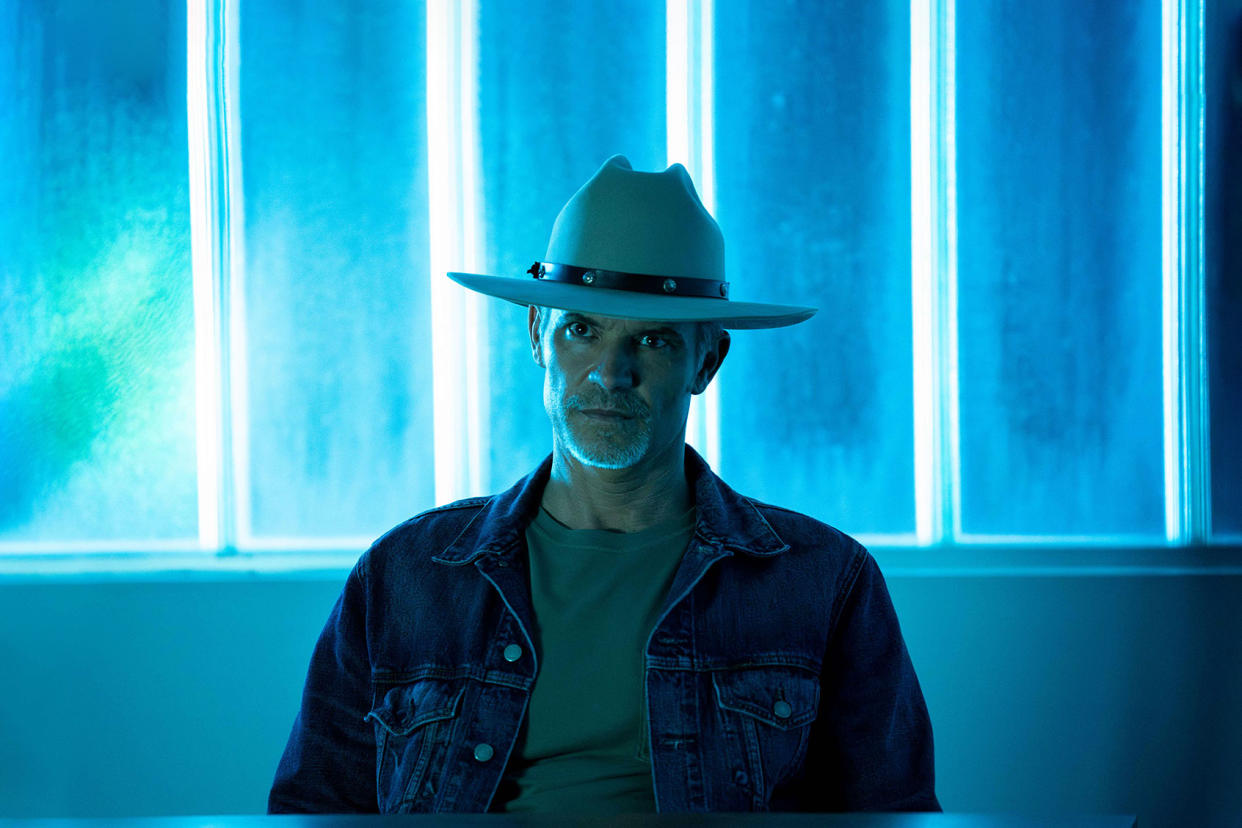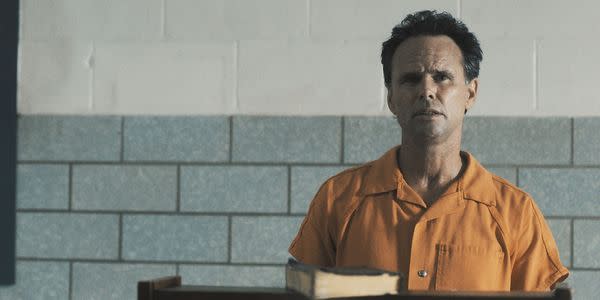A "Justified: City Primeval" ending breakdown: The good, the bad and the conflicted

The following contains major spoilers from the "Justified: City Primeval" finale
Walton Goggins is a liar.
From the moment news broke that FX's "Justified" was being revived as a limited series under the "Justified: City: Primeval" moniker, fans of the critically acclaimed neo-Western wondered if Goggins, who memorably portrayed the Kentucky outlaw during the show's six-season original run, would return alongside Timothy Olyphant as U.S. Marshal Raylan Givens. After all, what is "Justified" without Boyd Crowder? And who is Raylan without his greatest foil?
In the lead-up to the show's debut in July, Goggins gave interviews in which he stated he wasn't involved in the new series, which is set 15 years after the original finale and was adapted from Elmore Leonard's novel "City Primeval: High Noon in Detroit" (Leonard's short story "Fire in the Hole" served as the inspiration for the original series). Goggins' absence from the project makes sense; Boyd is still in prison in Kentucky, and the story takes place primarily in the Motor City. But in the "City Primeval" finale, Goggins was revealed to be a liar when – with a little more than eight minutes remaining in the episode, and with Raylan having recently retired from the Marshals after shooting and killing Clement Mansell (Boyd Holbrook) in Carolyn Wilder's (Aunjanue Ellis) kitchen – the action returns to Kentucky, twangy score and all.
Our first glimpse of Boyd since the iconic "We dug coal together" scene is familiar: dressed in prison orange and seen from behind, he's walking the halls of Tramble Penitentiary, holding a Bible. Next, he's seen delivering a sermon to his fellow inmates, also something we've seen him do before. He eloquently and passionately speaks about the hateful man he used to be and the possibility of change before revealing that his health is in decline and he's being transferred to a hospital to determine the cause. But, in typical fashion, it's all a ruse, as Boyd has planned an elaborate escape with the help of a female guard with whom he's having an affair. Once they lock the other guard (portrayed by Luis Guzmán) in the transport van, they set off for Mexico.
For "Justified" fans, Goggins' return to the action is an exciting moment, and one we all should have seen coming. Of course the powers that be wouldn't let a new season of "Justified" pass without a visit from the other half of the show's central duo, especially when he happens to be one of the best antagonists of all time. Speaking to the Los Angeles Times, executive producer and director Michael Dinner said that they knew they had to address the elephant in the room. "It was decided that we would bring him in at the end and have fun with it," he said. "It was a ball to do. Hopefully people will see it and let out a little rebel yell."
But what if, upon deeper reflection, one might also begin to question Boyd's appearance?
There's something that happens when Boyd changes out of his orange prison garb and into his all too familiar getup; the crisp white dress shirt, fitted vest, and dark jeans are a uniform that transforms Goggins and announces the charismatic criminal fans loved is back. In an instant, we're reminded of what "Justified" was for six seasons: a well-written, superbly acted and extremely funny crime drama about two men cut from the same cloth — one a lawman and one an outlaw — bound by shared history and experience but destined to be at odds. We're reminded of the show that once was, not the show we just finished watching. That six-minute scene, although it serves a purpose, threatens to overshadow the rest of "City Primeval," which was a good but different series. Goggins' appearance reminds us that, for as good as Holbrook was at inhabiting the dangerous, unhinged mind of Mansell, the character never quite measured up to Boyd or the other villains who made "Justified's" original run so uniquely compelling. But the real issue might just be what Boyd's return to the fold could mean for our favorite marshal.

Walton Goggins in "Justified: City Primeval" (FX)
When the action returns to Miami, Raylan is at peace, relaxing on a boat with his daughter, Willa (Vivian Olyphant). She asks him if they're going to talk about his decision to retire, but before he can respond, he receives an emergency alert about an escaped inmate from Tramble. It doesn't mention Boyd by name, but Raylan seems to understand immediately what it means, as if he's still deeply in tune with his friend-turned-foe after all these years. He stares at the phone for a moment before choosing to ignore the message, but it's clear there is an internal battle waging. The alert is then quickly followed by a call from the Lexington office of the Marshals Service. That too goes unanswered, though the phone is still ringing as the camera pulls away from the boat and the episode cuts to black. It's a sequence of events that can be read two ways.
The first, most cynical interpretation, is that FX is attempting to capitalize further on one of its best and most beloved properties, and is setting up another run of episodes that sees Raylan return one more time to go after Boyd, a man only he can possibly bring to justice. In an interview with The Hollywood Reporter, showrunner Dave Andron revealed Goggins' return was planned early in the development of the series but would not say that it was done intentionally to set up future installments of "Justified." However, in a time when revivals continue to dominate Hollywood, one could hardly fault FX and the creative team for potentially wanting to return yet again to the "Justified" well for a story involving both Raylan and Boyd. The fact that Ava (Joelle Carter) is still out there somewhere with Boyd's son also means additional narrative threads exist. So, a new limited series that pits an aging Raylan and Boyd against each other a final time is an offer that few could refuse (and Olyphant has already said he'd be willing to return for more).
But from a straight storytelling point of view, we've been there, done that, got the iconic parting line and bourbon hangover to prove it. So there is another interpretation of the show's final minutes, which is that Raylan is a changed man. Not even Boyd — the former friend and crafty criminal with whom Raylan frequently went toe-to-toe in Harlan — is enough to pull him back into service. It's a kinder, more optimistic read, one that doesn't threaten to erase the growth represented by Raylan finally choosing his family over his career, something he failed repeatedly to do over the course of the show. As his ex-wife, Winona (Natalie Zea), poignantly says in the finale, "If you couldn't do it for me, I'm glad you could do it for her." It's an emotionally loaded line that speaks to Raylan and Winona's long and complicated history, and Zea delivers it perfectly, with understanding and a hint of sadness but without frustration.
It's Raylan's decision to retire after fatally shooting Mansell — who was not reaching for a gun but a cassette tape — that ultimately gives "Justified: City Primeval" a reason to exist beyond corporate greed and/or cultural nostalgia. If the decision is immediately reversed in service of a Boyd-centric series, it could potentially undo not just the perfect ending of the original series but also the lessons Raylan learned in the revival. He isn't the man he used to be, and the world he inhabits isn't the same either. For Raylan to ignore the call from Lexington, to ignore the thrill of the chase and natural pull of Boyd Crowder, is a sign that Boyd was actually right: people can change.
And yet, based on what transpires in Kentucky, Boyd himself hasn't changed all that much. He is still the person he always was: a man who is whatever he needs to be in the moment, who will do anything to get what he wants. Over the course of the original six seasons, we saw many different versions of Boyd, which revealed not only his intelligence but also a keen ability to adapt to any situation. It is what arguably made him a compelling villain and a good foil for Raylan, a man who was, for better or worse, firmly stuck in his ways. If Raylan and Boyd represent two sides of the same coin, what does the fact that Boyd hasn't changed say about Raylan? Does it mean that he is lying to himself and the decision to retire won't stick? Does it further separate the two men? Or does it mean that Boyd has been unable to change because, until now, he's been unable to escape the life he was born into?
Want a daily wrap-up of all the news and commentary Salon has to offer? Subscribe to our morning newsletter, Crash Course.
Until FX announces a decision about the future of the show (or lack thereof), the way we interpret the ending of "Justified: City Primeval" likely says more about our own beliefs and desires than it does about the series. The question of whether people can change has long been debated. For years it seemed as if Raylan was not capable of it, or at least wasn't willing to put in the work ("If you wanted to change your life for me, Raylan, you would have done so by now," Winona once told him in Season 3). It's clear that something has shifted for Raylan, that his priorities are different now. But by leaving the series vaguely open-ended, with Boyd on the run and Raylan on the water, it allows us to make up our own minds. It's not the abrupt cut to black that ended "The Sopranos" and left fans debating the fate of Tony for years. But it does leave it up to personal interpretation, and there's something cathartic about Boyd escaping prison and Raylan breaking the cycle of parental disappointment and being there for his daughter. Rather than an ending that honors the past that tied Raylan and Boyd together, it's one that looks to the future, one in which both men leave Harlan alive. And what could be better than that?
Read more
about Westerns
